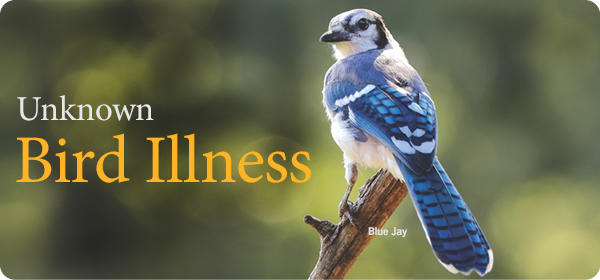
Dear Friends,
As you might have heard in the news recently, there have been several cases of reported bird deaths due to unknown causes. While the number of reports is not overly alarming, they are cause for concern. In addition, while the deceased birds have been primarily found in the Washington DC area, they have also been reported in parts of Northern Virginia, Maryland, West Virginia, Ohio, Maine, Kentucky and Indiana. Wildlife officials are actively looking for answers. It is not known if it is contagious or caused by something environmental.
What we know so far:
- Reported mortalities have mostly been Blue Jays, European Starlings and Common Grackles and are most often young fledglings.
- Symptoms include swollen, crusty eyes and balance/neurological issues.
- There is no known cure at this time.
- Lab results have ruled out the most common diseases that would typically impact birds in our area.
- Testing is ongoing. We are all waiting for further results.
Report any birds exhibiting these symptoms to DNR/ USDA Wildlife hotline at 877-463-6497.
There is speculation that this illness might be related to the Brood X cicada emergence in some way. The timing and geographical location of these occurrences makes this an interesting idea, but nothing has been concluded and this is purely speculation.
Because there are several unknowns, officials often recommend that bird feeders and bird baths be taken down until the cause has been determined. This is to reduce the number of birds congregating in one area, just in case there is something causing the illness that could be contagious.
The key is to ALWAYS be a responsible bird feeding hobbyist. Keep your bird feeders and bird baths clean! Please refer to our recommendations for Responsible Bird Feeding shown below. For the time being, consider using hummingbird feeders, finch feeders and suet feeders (the birds that use these feeders have not been affected) and enjoy walks or visits to local parks where you can enjoy birds in their natural setting.
The health and well-being of birds is our number one priority! We know that under normal circumstances, feeding the birds can have a tremendously positive effect on them when done responsibly. Feel free to stop by our store or call us with any questions. We appreciate your support as always! #savethesongbirds
Responsible Bird Feeding Techniques
If you enjoy feeding and watching your backyard birds, then you probably want to do as much as you can to practice your hobby safely and ensure the birds’ overall health and well-being. While the incidence of birds falling ill from feeders is small compared to other natural hazards birds face, there are things you can do to help your birds stay healthy.
- Provide multiple feeding stations in different areas of your yard to disperse bird activity.
- Provide seed from a bird feeder rather than scattering it on the ground.
- Keep areas clean under and around your feeders.
- Keep fresh seed in the feeder and be sure it doesn't get moldy.
- Clean your bird feeders regularly with a solution of one part bleach and nine parts water.
- The following strategies will help improve the health and safety of birds when the spread of avian diseases is a concern.
- If feeder birds are exhibiting disease symptoms, then remove all feeders so local birds ca disperse and utilize natural food sources.
- Clean and sanitize all bird feeders, bird baths and hardware with a 10% bleach (one part bleach to nine parts water) solution. Rinse thoroughly and allow to completely dry before refilling feeders. Continue to sanitize feeders every few days.
- Rake up and discard seed debris and bird droppings from the ground below and around feeders. Continue to clean these areas on a regular basis.
- Give the birds more space. If using multiple feeders, place the feeders farther apart from one another. This will reduce crowding, lower stress and lessen the potential for disease transmission between sick and healthy birds.
- Only use feeders that can be easily cleaned. Replace wooden feeders with ones made of plastic or recycled materials for easier cleaning.
- Bird feeders with cracks and crevices are difficult to sanitize and should not be used.
- Remove open tray and platform feeders that allow fecal material and food to come into contact with each other.
- Use antimicrobial bird feeders such as Wild Birds Unlimited EcoClean® Feeders. These feeders have built-in antimicrobial product protection on the treated surfaces.
If finch populations are involved:
- Initially reintroduce foods and feeders that will not attract finches (suet, safflower, peanuts, hummingbird feeders, etc.
- Reinstall finch feeders and food after an additional two weeks.
- Limit the amount of seed you provide. Offer only as much food as the birds will eat in one or two days.
- Store all bird seed in rodent- and insect-proof containers to avoid contamination.
- Always discard any seed that has become wet, moldy or foul smelling.
- Avoid handling sick birds and always wash your hands with soap and water after filling bird feeders.

